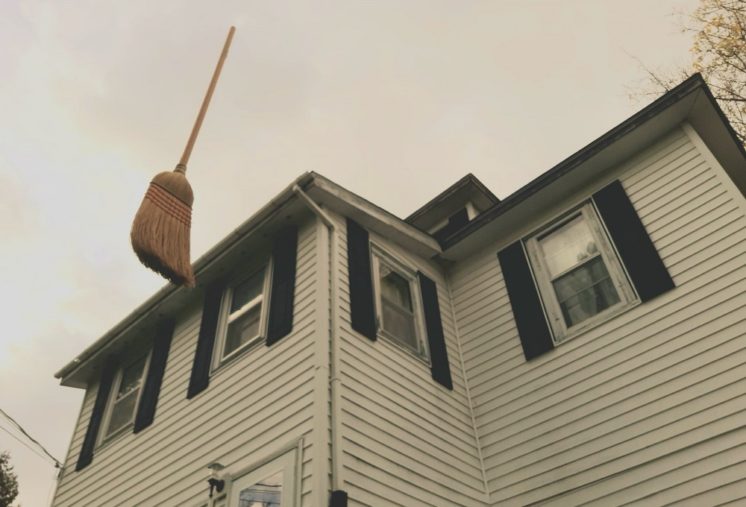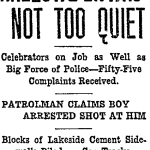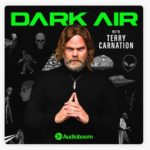Halloween spookiness awaits at the Icebox Radio Theater
Recently, a post appeared on my Facebook feed announcing the Halloween season of the Icebox Radio Theater in a creepy way. Jeff Adams, artistic director of the community theatre company that records in International Falls but is heard around the world, wrote:
We’re finally ready to tell this story. Years ago when my daughter was still at home, we worked together on a photography project taking pictures of our century-old Minnesota home. When we exported the photos to a computer for editing, this image was among them.
Thing is, neither of us remember seeing the broom, or even having a broom in the vicinity when we were shooting. After that, I grew curious about the history of our house and did some research. What I found astonished me. I put it all into a story which is being dramatized by the Frozen Frights podcast this month. Look for “Sweep,” a podcast fiction ghost story, on October 21st from the Icebox Radio Theater.
Icebox Radio Theater has been a mainstay in our region for a very long time. Here is what UMD student Ty Pearson had to say about Icebox. (I’ve shared this work with his permission.)
The Art of Professional Podcasting: Behind the Scenes of Radio Theater with Jeff Adams
by Ty Pearson
Several decades ago, radio was the apex form of entertainment. However, by the mid-twentieth century, film and television curtailed its triumph. For decades, the world of audio theater went quiet. Fortunately, the rise of podcasting ushered in the medium’s second golden era. Given this, it offers extraordinary opportunities for authors seeking their niche. This winter, I spoke with Jeff Adams of The Icebox Radio Theater about his journey to success, and how aspiring podcasters can attain similar.
In the early 1990s, Adams discovered his interest in drama through community theater. Particularly, “the interaction with the audience” made him realize his calling as an entertainer. However, he soon found that his true passion was radio theater.
“The most inspiring thing about it, is the speed with which you can get an idea and move directly to a story, or a presentation that can be enjoyed by an audience… You don’t have … costumes… You don’t have sets… You don’t have line memorization… Which means not every single story has to be knocked out of the park, I just love telling stories… This art form, more than any other, allows me to just explore that.”
Given what Jeff describes as podcasting’s “pared down” nature, one can get started with ease. Though, perfecting the art is far more complex.
“The gear right now is cheaper than at any point in history. It’s really easy to do a radio play at a certain level. You could probably learn how to do a piece of audio theater, first time out, within a day or two, and then you could spend the rest of your life trying to do it well.”
Throughout his career, Jeff mastered the art of podcasting. One key to this, was finding and collaborating with a strong “core” group of actors.
“I … cultivated with a local group … of people that I know and work with well … I’m still amazed at the level of talent in a town this size and this remote. But they’ve got lives, and the most challenging thing is … getting everybody on the same page.”
To do this, Jeff’s creative process involves multiple rehearsals. The first, is informal, which allows him and his crew to acquaint themselves with new material. Then, they hold a more serious meeting to polish the script. As the IBRT’s primary writer, Jeff is an expert on podcast narratives. With respect to plot, he emphasizes designing around radio theater’s unique format.
“It’s a broadcast medium traditionally. That’s the most difficult structurally to write in. Especially, if you listen to old radio … [anthologies] … like Lights Out and Escape, and Hermit’s Cave … it’s often just a single conflict … they have time for. An old 24-25-minute broadcast, you would be like: we’re going to go to the house, and they say it’s haunted, and then we see the ghost, and then … someone disappears, and then they resolve that, and that’s it. That’s your half hour show. That’s all you have time to do.”
Considering these constraints, podcast character development can be challenging. Nonetheless, Jeff has created numerous remarkable personalities over the years. According to him, genre should govern the type of individuals a writer incorporates in their narrative. Hence, IBRT’s comedies such as “The Laugh Track” center around whimsical personalities. Whereas horror stories like “Frozen Frights,” tend to focus on characters with unsettling backgrounds.
Like plot and characters, setting is also vital for listener immersion. IBRT’s plays have rich atmosphere, largely thanks to Jeff’s clever use of a concept known as “emblematic sound.”
“What it means, is there are ways that people perceive sounds that aren’t necessarily obvious, and they can put [them] right into a scene. Cornstarch is ancient. When you’re doing footsteps in snow…you either use shoes and corn starch, or you can put cornstarch into a little bag…squeeze it rhythmically, and that sends the message.”
In addition to foley, music is crucial to the mood of radio theater. At IBRT, a hybrid of in-house and external tracks are used to evoke feeling in their productions. Then, they fuse everything together in editing software. Once a podcast is nearly complete, Jeff announces it across IBRT’s social streams.
“I am just beginning to get the idea of branding beyond basic social media (Twitter, Facebook, and Instagram). We…have a website…we do a few ads on Facebook…[and] as a nonprofit … we are part of the … Google Grants Program, which is limited [free] ads for nonprofit. That brings some people to the landing page on the website.”
On top of promotion, Jeff commercializes IBRT via donations, fundraisers, grants, merchandise, and Patreon. As a result, he carved out a career in radio theater. Considering its growing prominence, and ease of access, up-and-coming authors can certainly benefit from Adams’ tips for production, promotion, and plugging along in the podcast world.
“[Eventually], you get to a point where quitting is actually harder than keeping going. “[If] you go back a generation…getting involved in the arts was a totally different thing. Your primary job starting out was to impress somebody who had the keys to the kingdom. [Today’s] generation, and I imagine every generation moving forward…get[s] to make [their] thing now. That’s one of the benefits of the Internet. We can literally tell whatever kind of story we want, and we can reach an audience anywhere. We got just enough success, to where I can look back and say, yes, this was worthwhile”.
Jeff Adams is the Artistic Director of the Icebox Radio Theater. Since 2004, under the slogan “Bringing the Northland’s Stories to the World” he and his colleagues have produced over 250 plays, 11 series, and broadcast worldwide, earning both the Silver Ogle and Mark Time Award. In addition to podcasting, Jeff and IBRT have performed live shows at Bryant Lake Bowl in Minneapolis, their hometown of International Falls, Minnesota, and more.
Ty Pearson is a college student at the University of Minnesota Duluth. He is pursuing freelance non-fiction writing, documentary filmmaking, and music/audio production. He is inspired by Jeff Adams’ artistic direction and knowledge of creating and marketing internet entertainment.
Recommended Links:
Leave a Comment
Only registered members can post a comment , Login / Register Here














No Comments